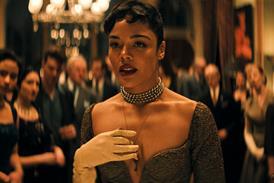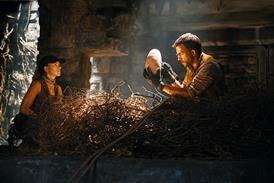Dir: Vicente Aranda. Sp-It-Port. 117mins.
A costume drama driven by lead Pilar Lopez de Ayala's impacting central performance, Mad Love (Juana La Loca) is Spain's official entry for the foreign language Oscar nominations, having beaten out sexier options such as Penelope Cruz film No News From God and Julio Medem's Sex And Lucia. That official nod, combined with positive critical response, good word-of-mouth and Lopez de Ayala's best actress win at September's San Sebastian festival has pushed Juana into a surprise position as Spain's fourth top-grossing hit in its home market so far this year, taking $5.1m and still in the top five after nine weeks. However, the film's pull for international audiences may be limited by the usual issues of language and lack of name stars, and further constrained by its inspiration from a chapter of history unknown to most audiences outside Spain.
The question of whether or not Juana of Castilla, the daughter of Spain's 15th century monarchs Queen Isabella and King Ferdinand, went mad out of passion for her philandering husband Felipe has intrigued Spaniards and inspired myriad books, plays and more than one previous film - most notably Juan de Orduna's 1948 Locura De Amor. Working from the same original play script as Orduna, Juana writer-director Vicente Aranda takes a clear position, and one decidedly influenced by the modern day; that the future queen was passionate, in some ways ahead-of-her-times and seriously self-destructive - but not crazy.
Best known for his female-driven and often erotic films (Turkish Passion, The Naked Eye), the veteran Aranda's toned-down script is contrived to create a sympathetic character portrayal of Juana, going so far as to give her a hero's speech in a climactic scene where she reclaims her birthright to the throne. The film's central drama commences when Juana first meets her politically arranged husband, Felipe (Liotti), and amorous sparks fly. But while Juana's passion quickly blooms into jealous obsession, Felipe's eye begins to wander. His aspirations to reign Castilla also grow and, spurred on by hungry advisers, he attempts to wrest power from the recently crowned Juana by having her declared mad.
The film's biggest drawback is an unnecessary voiceover narration which, in a bland masculine inflection reminiscent of film trailers, offers historical details and the occasional descriptive, fairytale-like comment such as: "Despite everything, the days and nights went on happily in the palace."
But Lopez de Ayala gives a visceral performance which captures the audience and has positioned her as the actress-to-watch in Spain at the moment. With her plain yet attractive features and young physique, she was also physically well cast in the role of the twentysomething future queen. Liotti matches her with a solid performance, although his character is written with less profundity and the actor is unfortunately dubbed to mask his native Italian accent. Palatial set designs and wardrobe are lavish, although historical colour could have been further enriched with more scenes outside the confines of the palaces (whose absence was possibly due to the film's sub- $5m budget).
Prod cos: Enrique Cerezo PC, Production Group, Take 2000
Sp dist: Warner Sogefilms
Int'l sales: Sogepaq
Prod: Enrique Cerezo
Scr: Vicente Aranda
Cinematography: Paco Femenia
Ed: Teresa Font
Prod des: Josep Rosell
Mus: Jose Nieto
Main cast: Pilar Lopez de Ayala, Daniele Liotti, Manuela Arcuri, Eloy Azorin, Rosana Pastor, Giuliano Gemma



















No comments yet